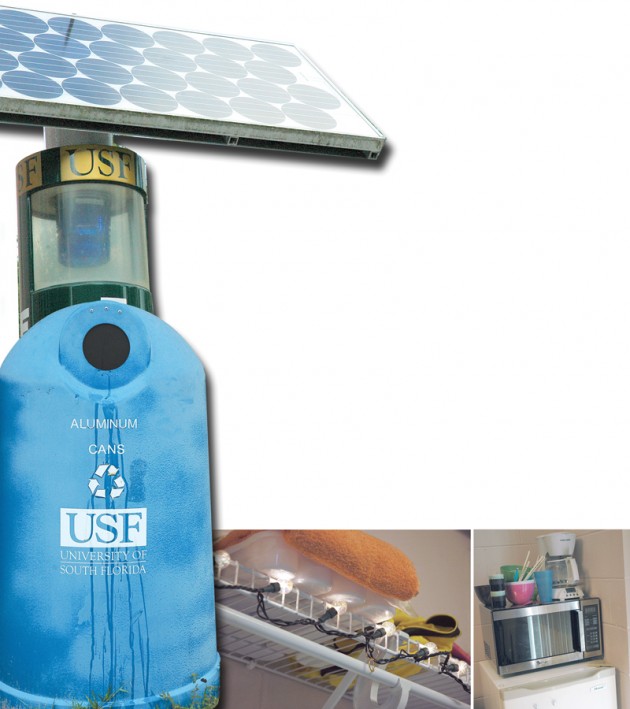It’s not easy living green

A friend of mine once told me he had always assumed that “young” and “liberal” were synonymous. Though the political divide on campus disproves such a claim, there is one thing that I’ve found most students agree on: They don’t want the world to end.
Student environmental advocacy can be attributed in part to ConservaBull, a student-run program dedicated to keeping campus residents conscious of energy conservation.
ConservaBull is based on a sacrifice-and-reward system in which the students living in the residence hall that uses the least amount of energy are thrown a party, given free T-shirts and entered in a raffle to win an iPod touch.
Prizes are a fine way to get residents involved in energy conservation, but it’s not like a student can be a full-fledged environmentalist when living the dorm life. It’s not easy to be green when residence halls aren’t accommodating to an eco-lifestyle.
Most of the ConservaBull Web site’s tips for reducing one’s carbon footprint sound like they were drawn up by a roundtable of fussy mothers. The list includes nagging mom classics like “Turn off lights when you leave the room” and “Take shorter showers.”
Admittedly, those are both serious tips that will reduce one’s impact on the environment, but they are on the short list of things that are within students’ control (the only other being the ability to adjust the air conditioning). And it doesn’t help that the list of tips goes on to cheapen the environmental struggle with suggestions like “Save water: shower with friends!” and “Forget those energy consuming cell phones, communicate with ESP.”
The trivialization has given some students a casual attitude toward environmentalism, said Patricia Sennhauser, a freshman majoring in international business.
“It’s hard to think what you do for the environment makes a difference when no one else seems to care,” she said. “I do think the way I live has an impact on the environment, but others’ actions can be discouraging.”
At times it is nearly impossible for students to fully manage their environmental impact because of services and items included in room fees. In traditional-style halls with community bathrooms, there is no control over cleaning chemicals used. If a student is as bleeding-heart as he or she claims to be, then he or she can buy non-toxic bathroom cleaner and start scrubbing, but that’s not going to stop maintenance from doing their job with their own supplies.
The custodial system might be too large to overhaul at this time, but there is one project at USF that can be taken at least a little seriously.
Rebecca Killik, a sophomore psychology major, said she is most aggravated with the dearth of on-campus recycling bins.
“Aside from the small bin for cans, we don’t have any recycling receptacles that are nearby my dorm,” Killik said. “The only place that has the big receptacles is all the way by the softball fields. That’s out of the way for a lot of students and I think it’s what holds back many people from recycling.”
It’s a sight that elicits head-shaking disapproval: an empty recycling bin with “USF Recycles” printed on its side — the only one seen for a solid 15 minutes of walking.
College is supposed to transition students into the real world by providing an experience that is a model of what lies ahead. If that is so, then what can be learned by living on USF’s campus is that in the real world big shots don’t care enough about the environment to help people become green — and changing the impact on the Earth is about as simple as rocket science.
If students don’t want that to be their reality, they need to take action to improve the world.







